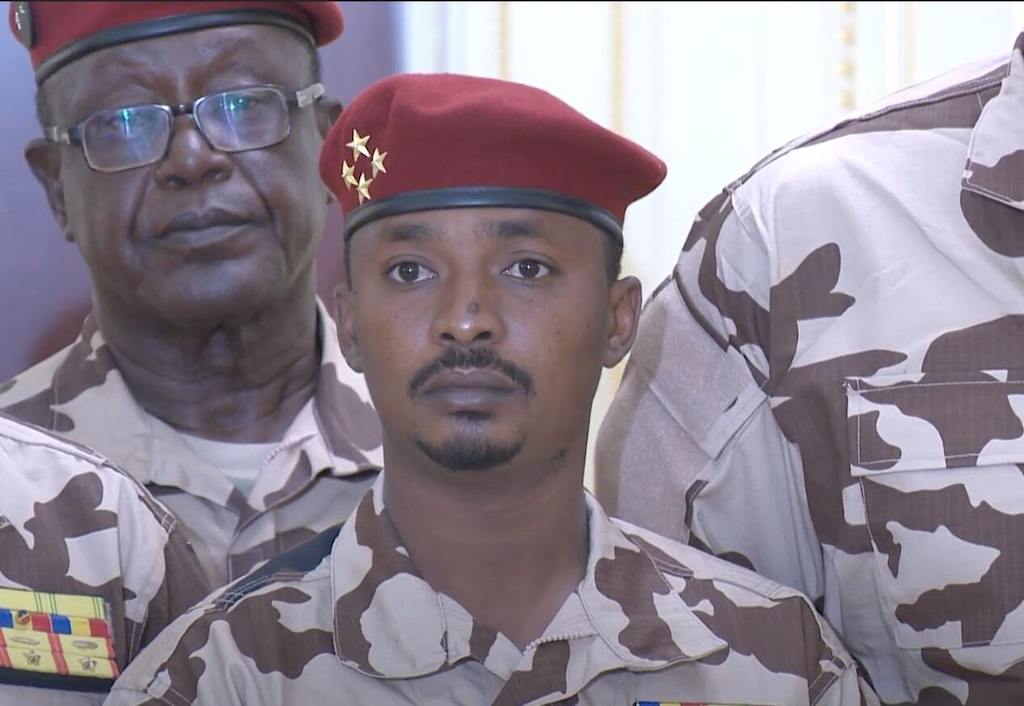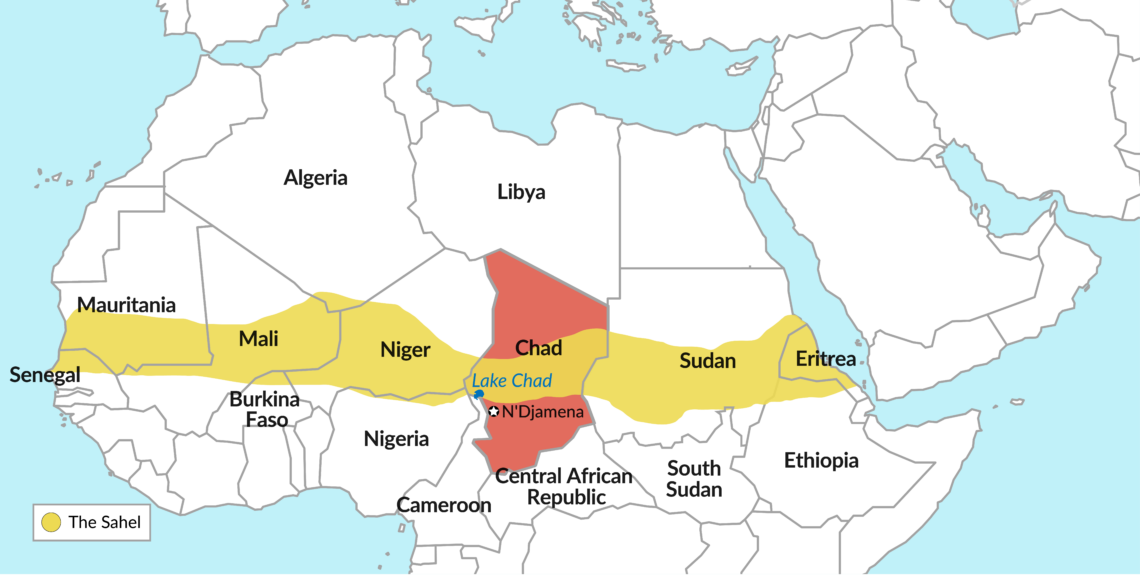The crisis in Chad deepens instability in sub-Saharan Africa
The death of President Idriss Deby will have a regional impact far beyond Chad. France and the U.S. considered the iron-fisted Deby regime a linchpin in the fight against Islamist extremism in West and Central Africa.

In a nutshell
- Chad helped Western powers fight Islamic insurgents
- Its new leader took power unconstitutionally
- More instability awaits sub-Saharan Africa
The death of Chad’s President Idriss Deby was sudden and not fully explained; he was supposedly killed in combat north of the capital, N’Djamena, on April 20, 2021, shortly after his reelection for a sixth term in office. This event is certain to have enduring consequences for Africa’s volatile Western and Central regions.
Fragile transition
Though hardly a Jeffersonian democrat, President Deby – who held power for three decades – had become an agent of stabilization in a region characterized by state fragility and chronic insecurity. On the domestic front, he ruled with an iron fist and was feared by his people. He contained the opposition with the support of the security forces, often through violent repression. Not surprisingly, opposition leaders had called for a boycott of the April elections.
After the president’s death at 68, his son and leader of the presidential guard, 37-year-old Army General Major Mahamat Idriss Deby, was declared interim president by a military junta. However, whereas the younger Mr. Deby enjoys relative support among the security forces, his rule lacks legitimacy. The parliament and government were dissolved, and the country’s constitution – which stipulates that in the event of the president’s death, the speaker of the parliament or, failing that, the first vice president should take over – was suspended.
Although the younger Mr. Deby enjoys relative support among the security forces, his rule lacks legitimacy.
Gen. Deby pledged to establish an inclusive national dialogue and that the elections would be held at the end of an 18-month transitional period. But while all transitional regimes are fragile in nature, Mr. Deby’s is particularly vulnerable due to a combination of internal contestation and regional instability.
Multiple challenges
Amid uncertainty involving multiple actors, there are several challenges to stability and the return of constitutional order in Chad. At the domestic level, there is an open conflict between the Transitional Military Council (TMC), a mostly urban opposition mobilized around political parties and civil society organizations, and armed rebel groups organized along tribal lines. Recent events suggest that this conflict will be difficult to resolve, at least in the short to medium term.
After the TMC took power, intense demonstrations erupted in N’Djamena and Moundou, with protesters calling for a return to civilian rule. The security forces responded violently: at least five people were killed and hundreds were arrested. At the same time, the military continued their attempt to contain the advance of rebel forces led by the Front for Change and Concord in Chad (FACT). Its strength is estimated at between 1,500 and 2,000 fighters.
Active since 2016, FACT forces had crossed into Chad from Libya on the April election day. Formed by dissidents of the Chadian army, FACT and other rebel groups opposing Idriss Deby have taken advantage of the disintegration in Libya that followed the overthrow of Muammar Qaddafi in 2011. The fall of his regime has had a dramatic and lasting impact on the region’s security. As first seen in the 2012 rebellion in Mali, the power vacuum in Libya provided all sorts of insurgents in the area with an operational basis, access to arms and multiple allegiances.
Regional and international trouble
In his first address to the country, Mahamat Deby emphasized his intention to honor Chad’s international commitments, including its responsibilities in the fight against terrorism. This statement was not a coincidence. The new president knows that whatever leverage he may have in the immediate neighborhood and international arenas comes from the vital role played by the Chadian military in the region. The Sahel and Lake Chad region has become a haven for terrorist and organized crime groups, including affiliates of the Islamic State.
Facts & figures

The biggest security threat now is the Islamic State in West Africa Province (ISWAP). A Boko Haram splinter group, ISWAP was formed in 2016. Unlike Boko Haram under the leadership of Abubakar Shekau, this new group initially refrained from massive violence against civilians (including women and children), preferring military and governmental targets instead while trying to create a standing army and exert effective control over territory through systems of taxation.
The flip side of this mutually beneficial relationship was that France had to back the Deby regime.
Thanks to the late Chadian leader, described by French President Emmanuel Macron as a “brave friend of France,” Chad had become an effective ally in the struggle against terrorism in the region. N’Djamena was the home of Operation Barkhane (the ongoing French anti-insurgent military operation that started in 2014) and the Chadian army, which is the best-trained in the region. It has become vital for the G-5 Sahel joint force (where it recently dispatched 1,200 troops), backed by the United Nations, the African Union, the European Union, and France. The flip side of this mutually beneficial relationship was that France had to back the Deby regime. In 2019, for example, French air strikes helped contain a rebel convoy whose goal was to seize N’Djamena.
However, the current political situation in Chad puts members of this anti-terror alliance in the Sahel between a rock and a hard place. A scenario of protracted conflict or state fragility would severely undermine regional security. At the same time, Chadians are increasingly signaling their opposition to the TMC, and the security forces are responding with violent repressions. Escalating violence will make it hard for regional and international actors to support President Mahamat Deby.
Scenarios
Events in Chad will continue to impact the Lake Chad and Sahel region. Concerning the current context, three scenarios emerge:
The Malian solution
Under this first and slightly more likely scenario, the TNC will cave in to regional and international pressure, particularly from France and Nigeria, and accept a hybrid solution: a transitional government composed of a civilian president and a military vice president. This approach would be in line with what transpired in Mali following the military coup that removed President Ibrahim Boubacar Keita from power in August 2020.
However, whereas such a solution could contain further instability in the short term, it would not address the roots of the country’s political crisis. Also, given the threat posed by armed rebel groups and Chad’s key role in regional security dynamics, the military would likely retain their leverage and continue to dominate domestic politics in practice.
Even under this relatively optimistic scenario, the tension and armed clashes would continue. While an agreement between the military and the civilian opposition seems feasible, any dialogue between the military and FACT remains implausible. The group is willing to negotiate a cease-fire and participate in the national dialogue. However, it adamantly rejects the transition regime led by the late president’s son: “Chad is not a monarchy. There can be no dynastic devolution of power in our country,” FACT rebels declared in a statement.
The fact that the group is considered responsible for President Deby’s death also does not help. However, despite the attacks led by the military against the rebels, FACT has maintained its operational capacity.
Low-intensity civil war
A second, less likely, scenario is that of a civil war emerging in the political void. The fragility of the TMC may encourage other rebel groups to join FACT. If they managed to reach the capital, Chad would likely withdraw its forces deployed in the broader region. Most of the armed forces remaining there are underfunded and lack the necessary training and equipment to address multiple security challenges. Meanwhile, the Nigerian security forces are already under high pressure due to internal threats, including terrorism in the northeast region, rising levels of communal violence in the Middle Belt and South and separatist aspirations in Biafra. This scenario would have fargoing security and humanitarian consequences.
Business as usual
Under this less likely scenario, President Mahamat Deby would gain tacit support from regional and international powers. They would tolerate the current internal solution in Chad and possibly provide support to help its military stop the advances of rebel groups.
However, under any scenario, the security situation in the Sahel will deteriorate in the short to medium term. This may upset political balances and security frameworks, which are already fragile in countries like Mali or the Central African Republic. For international powers, and specifically for France, recent events are also challenging. If Paris proceeds with its plan – announced before the death of Idriss Deby – to reduce its military presence in the region, further violence and fragmentation could follow.








